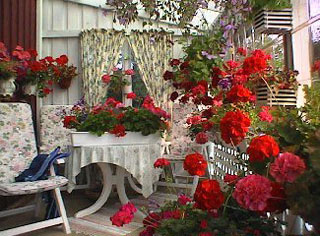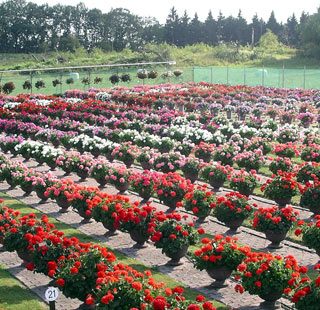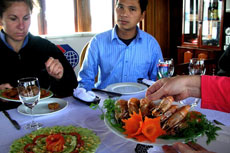Human Flower Project
Thursday, March 29, 2007
Where Your ‘Geraniums’ Come From
The world leader in pelargoniums, Fischer, has sold to a Swiss agri-chemical company.

Pelargoniums/Geraniums, looking homey
Photo: Umea Universitet
What we non-botanist types call “geraniums,” those potted plants of summer with the red and white and pink moppy heads, are actually pelargoniums. But whatever you’ve been calling them, there’s a good chance some of yours can be traced back to the Fischer company in Germany.
 Gerhard Fischer
Gerhard Fischer
Photo: Fischer
Gerhard Fischer began it all in 1959, with a nursery operation near Koblenz. “Les géraniums lui ont procuré une telle passion qu’il spécialisa l’entreprise dès le début sur cette culture.” (Geraniums inspired such a passion in him that he specialized in them from the outset of his business.) He moved the operation to Hillscheid in 1962. From laboratories there he and his horticulture team concentrated on developing disease resistant strains and by the mid 1970s, the company’s creations—GRAND PRIX, TANGO, SCHÖNE HELENA, and RIO—to name a few, were shipping across the world.
Each year the company begins a work-up on 30,000 new pelargoniums. The horticulturists narrow down to a mere 2000, based on 70 criteria. These are then field tested to see how they’ll fare in three very different climate conditions, and finally five or so new varieties will head to market.
 Fischer’s pelargonium field trials
Fischer’s pelargonium field trials
Photo: Syngenta
Growing petunias, poinsettias, vinca, and impatiens, as well as their renowned pelargoniums, Fischer has been a private company. Until now. It’s been bought by Syngenta, a Swiss company, for $67 milion (USD) “on a cash and debt free basis.” Fischer reported sales for 2005-2006 of $86 million and employs about 1700 people. It “sells flower crops in over 20 countries under well-known brands including Fischer® and pelfi®; these brands will be maintained,” Syngenta announced. The U.S. offices of Fischer are in Boulder, Colorado.
But what about Syngenta? It’s own flower division had 2006 sales nearly three times the size of Fischer’s—$228 million. And flowers are a small patch in the Swiss company’s estate. Its total sales (2006) were roughtly $8.1 billion. Syngenta employs 19,5000 people in more than 90 countries.
Announcement of the Fischer sale crackled through the financial wire services today. But Syngenta also made news for quite another reason. South Africa has rejected the Swiss company’s request to grown genetically modified corn for biofuel.
Melanie Gosling writes, “The government turned down the application from seed company Syngenta because it said it had not convincingly shown that the maize was safe for food or animal feed. Although the GM maize was intended to feed cars, not people, the government said it was possible that the GM maize would become mixed with ordinary maize grown for food. The department of agriculture’s executive council, which regulates the GM industry, also said the GM maize could harm South Africa’s maize export industry.”
Josef Fischer, CEO of the German pelargonium specialists, announced his company’s sale in the lantern-jawed language of corporate happiness: “Combining our varieties, cultivation knowledge and supply processes will enhance our service and support to all our customers, with whom we can now access exciting growth potential in flowers.”
Would that be floral or financial “growth potential”? In any case, this news fails to enhance our “passion” for pelargoniums.




